- Home
- Michael Ondaatje
In the Skin of a Lion Page 9
In the Skin of a Lion Read online
Page 9
This was choreography in 1930.
In those photographs moisture in the tunnel appears white. There is a foreman’s white shirt, there is white lye daubed onto rock to be dynamited. And all else is labour and darkness. Ash-grey faces. An unfinished world. The men work in the equivalent of the fallout of a candle. They are in the foresection of the cortex, in the small world of Rowland Harris’ dream as he lies in bed on Neville Park Boulevard.
Such a strange dream for him. The silence of men coming out of a hole each within an envelope of steam. Horses under Lake Ontario. Swallowing the water one-and-a-quarter miles away, bringing it back into his body, and spitting it out clean.
Patrick ate most of his meals at the Thompson Grill on River Street where the waitress, through years of habit, had reduced to a minimum the action of pouring coffee or flipping an egg. He could spot the oil burns on her wrists, the permanent grimace in her eye from the smoke.
If she looked at those who ate here it occurred when they were not aware of it. She seemed self-sufficient, something underwater in the false yellow light of the narrow room against the street, the flawed glass creating shadows in the air. There was something transient about her though she had been there for years. Most of the chewers at the Thompson Grill had that quality.
Patrick would sit at an uncleared section so he could watch the fingers of her left hand pluck up the glasses and cups while the other hand, the muscles in intricate movement under the skin, swabbed the counter clean. It was several months before he became aware of the tattoo high on her arm, seeing it through a tear in the seam where the cotton had loosened.
He came to believe she had the powers of a goddess who could condemn or bless. She would be able to transform the one she touched, the one she gripped at the wrist with her tough hand, the muscles stiffening up towards the blue-black of the half-revealed creature that pivoted on the bone of her shoulder. His eyes wanted to glimpse nothing else.
He pinned the note, saying Waterworks – Sunday 8 p.m. to the wall above his bed in case he forgot, though it had been his only invitation in two years. “The cheese stands alone,” he’d sing to himself, while buying groceries along Eastern Avenue. Patrick loved that song. He found himself muttering “The farmer takes the dog … the farmer takes the dog” among the Macedonians, as if perfecting a password. The southeastern section of the city where he now lived was made up mostly of immigrants and he walked everywhere not hearing any language he knew, deliriously anonymous. The people on the street, the Macedonians and Bulgarians, were his only mirror. He worked in the tunnels with them.
He had discovered the Macedonian word for iguana, gooshter, and finally used it to explain his requests each evening at the fruit stall for clover and vetch. It was a breakthrough. The woman gazed at him, corrected his pronunciation, and yelled it to the next stall. She came around the crates and outlined the shape of a lizard. Gooshter? Four women and a couple of men then circled him trying desperately to leap over the code of languages between them. His obsession with vetch had puzzled them. He had gone at one point into the centre of the city, bought some, and returned to the Macedonians to show them what he needed. The following week, a store owner had waved it to him as he came down Eastern Avenue. Vetch was fee-ee. But now they were onto serious things. A living creature, a gooshter, had been translated. He was surrounded. They were trying to discover how many he had. Was raising them one of his professions? They knew where he lived, of course, had seen his yellow light looking down on Wyatt Avenue, knew he was alone, knew down to the very can of peaches what he ate in a week. Peaches on Friday. They had sent someone to find Emil, who spoke the best English, and when the boy arrived he said, “Peaches on Friday, right?”
Patrick felt ashamed they could discover so little about him. He had reduced himself almost to nothing. He would walk home at dusk after working in the lake tunnel. His radio was on past midnight. He did nothing else that he could think of. They approved of his Finnish suit. Po modata eleganten! which meant stylish! stylish! He was handed a Macedonian cake. And suddenly Patrick, surrounded by friendship, concern, was smiling, feeling the tears on his face falling towards his stern Macedonian-style moustache. Elena, the great Elena who had sold him vetch for over a year, unpinned the white scarf around her neck and passed it to him. He looked up and saw the men and women who could not know why he wept now among these strangers who in the past had seemed to him like dark blinds on his street, their street, for he was their alien.
And then he had to remember new names. Suddenly formal, beginning with Elena. The women shook his hand, the men embraced and kissed him, and each time he said Patrick. Patrick. Patrick. Knowing he must now remember every single person. And now, because it was noon, the King Street Russian Mission Brass Band fifty yards down the road, they invited him to lunch which was set up on tables beside the stalls and crates. He was guest of honour. Elena on one side of him, Emil on the other, and a table of new friends.
He was brought a plate of cabbage rolls – sarmi, Elena said, and suddenly the awful sulphurous odour he had smelled for the last year since moving was explained. Emil was describing the technique of soaking cabbage leaves in a solution of salt and water and a bit of vinegar and leaving it there for days. Patrick ate everything that was put in front of him. During coffee, Kosta, the owner of the Ohrida Lake Restaurant, sent along a question to Emil. Emil asked two or three others first to see if this question was apt. Then he turned to Patrick. “What else can you do?” The table was silent. Elena put her hand on his and sent a qualifier via Emil. “It does not matter if you don’t do anything.” The others down the table nodded.
– I used to be a searcher. I can work dynamite.
Emil’s translation created an even greater silence. Patrick could hear every note of the Russian Mission Band down the street. Then Kosta jumped up and yelled something at Patrick. His face looked at him with anger, full of passion. Emil turned to Patrick now, having to yell above the sudden din at the table. “He says ‘Me too, me too.’ ” Kosta grabbed a round loaf of bread, leapt free of the bench, and booted it down the road in the direction of the Russian Mission Band.
Later that afternoon when Patrick was showing the iguana to the street, the man Kosta said, “The waterworks at eight, Sunday night. A gathering.” Then he drifted away, not allowing Patrick to reply or question the invitation.
An hour after dusk disappeared into the earth the people came in silence, in small and large families, up the slope towards the half-built waterworks. Emerging from darkness, mothlike, walking towards the thin rectangle of the building’s southern doorway. The movement was quickly over, the wave of bodies had seemed a shadow of a cloud over the slope.
Inside the building they moved in noise and light. It was an illegal gathering of various nationalities and the noise of machines camouflaged their activity from whoever might have been passing along Queen Street a hundred yards away. Many languages were being spoken, and Patrick followed the crowd to the seats that were set up around a temporary stage. He saw Kosta, who was busy greeting and shepherding people, and he watched him until Kosta caught his eye. Patrick waved and Kosta raised his hand and continued with what he was doing. Patrick felt utterly alone in this laughing crowd that traded information back and forth, held children on their laps.
The four-piece band was playing by the stage. It was a party and a political meeting, all of them trespassing, waiting now for speeches and entertainment. Patrick found a seat and took a sip from his flask. Almost immediately the electric lights were turned off, leaving only the glow from oil lamps on the edge of the platform.
The puppets arrived on stage in a mob, their wooden bones clattering. The semicircle of oil lamps cast yellow onto this section of the pumping station – onto the generators, the first few rows of the audience, the mosaic tiles, and brass banisters. Patrick looked up and saw the grid above them on the upper level, hardly visible, where the puppeteers must have been lying in darkness.
The forty pupp
ets moved into the light, their paws gesturing at the air. The males had moustaches and beards, the females had been given rouged faces. There was one life-sized puppet. This giant in their midst was the central character in the story, its face brightly coloured: green-shadowed eyes and a racoon ring of yellow around them so they were like targets. All of the puppets looked stunned. Feet tested air before each exaggerated step was taken on this dangerous new country of the stage. Their costumes were a blend of several nations. It was five minutes into the dance before Patrick realized that the large puppet was human. And this was only because the dancer moved out of his puppet movements and began to twirl in gestures impossible for wood.
The large figure began to distinguish itself from the others. It became a hero not by size but by gesture and the detail of character. Perhaps it was an exceptional puppet of cloth as opposed to an exceptional human being. Behind the curled moustache it was perturbed and nervous – ambitious, scared, at times greedy. It varied its emotions from fear to desire. The other puppets included a prune-faced rich woman, a policeman, the sly friend, the family matriarch. The hero linked them all. There was no noise, no drum-beat or song. Just the clattering of their feet, just the wooden hands touching each other gently the way fingernails touch glass. The puppets ranged all over the stage or huddled together as a chorus, warning the hero of his ambition, gesturing him down with laws. The human puppet, alien and naive and gregarious, upset everything. The face, in spite of the moustache, was dark and young. He wore a Finnish shirt and Serbian pants.
A plot grew. Laughing like a fool he was brought before the authorities, unable to speak their language. He stood there assaulted by insults. His face was frozen. The others began to pummel him but not a word emerged – just a damaged gaze in the context of those flailing arms. He fell to the floor pleading with gestures. The scene was endless. Patrick wanted to rip the painted face off. The caricature of a culture. His eyes could not move away from that face.
The audience around him was silent. The only sounds on stage were grunts of authority. They were all waiting for the large puppet to speak, but it could say nothing. The thick eyebrows, the big nose, the curled moustache – all of which parodied them – became haunting. When the figure wheeled now the sweat on the pink brocade shirt made it blood-red along the spine and shoulders. It stamped a foot to try and bring out a language. The other puppets shifted like bamboo to the side of the stage. The figure knelt, one hand banging down on the wooden floor as if pleading for help – a terrible loudness entering the silent performance.
The audience began to clap in unison with the banging hand, the high hall of the waterworks echoing. Patrick was unable to move, his eyes locked upon the crouched figure, the manic hand. If it was not stopped it would burst. That was absurd. He wanted the hall to be quiet, the figure’s terror stopped. He could see the yellow-ringed eyes, the shirt bloody from the darkness of sweat, the mask of the painted face looking up like a dog. Patrick stood up and stumbled over feet until he reached the aisle. He wanted to be out of here, out of this building. He was covered in the heartbeat of applause which started to come faster. Each footstep as he moved released the terrible noise. He was among members of the band, the silent band which sat there waiting for the next act when they would be required to play. He saw the huge instruments on their laps which in their curls and convolutions looked like frozen organs of the body. He climbed up, slipping at first because he still couldn’t remove his eyes from the face and the banging white hand. He stepped over a lamp. Then he was up there on stage, and as soon as he approached the exhausted figure he saw up close that the performer was much smaller, that it was a woman.
He knelt and held her by the shoulders, his arm on her damp back. He leaned forward, caught the hand still trying to smash down again like a machine locked in habit, a swimmer unable to stop. He swerved the palm away from the floor and brought it slowly down to her thigh. Then he looked up, through the halo of light into the sudden silence.
There was a crowd standing on the upper level as well. Hundreds more than he had thought. He looked back at the woman, the costume made of false silk, a cheap glittering material from the streets, drenched in sweat. This close he could recognize nothing of the figure he had seen perform. It seemed washed out, exhausted statuary. One tear of sweat cut a path through the thick makeup. Now the eyes, hidden in the circles of paint, focused on him, then reacted with shock. She bent forward. He felt his hand slide against the sweat of her cheek. He had forgotten where he was. She pulled herself up, her arm on his shoulder. She walked downstage slowly towards the kerosene lights, spreading her hands wide and then clapping them. A slow beat. There. There. There.
Then, with her arms out, the crowd cheering, she raised her swollen hand and now everyone was standing yelling at her. She brought her fingers to her lips and the audience became quiet. She threw the name of the next performer into their midst like a bell, and a man walked into the light carrying an umbrella. The crowd was immediately with him. Patrick began to move backwards to the makeshift curtain. He looked down embarrassed and when he looked up again she had left the stage.
Backstage he would be an outsider. He recalled the touch of that hand on his shoulder as she pulled herself up. And the voice he had recognized. He tried to remember the washed-out face, its features under the makeup. Behind the curtain there were just a few performers in half-light – one kerosene lamp on the floor. How should he enter a room where a giant takes off its head? Where a dwarf stands up to full height. The Macedonian juggler he had watched perform half an hour earlier with absolute abandon was packing the thirty hard oranges neatly into his suitcase. No sofas, or arches of light, just performers cleaning up. A man putting on his socks. Someone reading The Racing News. At the far end of the hall he saw an Indian walking a puppet towards a corridor, as if escorting someone frail. Patrick went after him. The man turned right along the Venturi corridor and disappeared behind another curtain. Here among the strangely shaped pipes and meters the air was humid. A great cheer went up from the audience. As the man came out Patrick caught his arm and asked him where the puppet dancer was. The Indian jerked his head towards the curtain and handed him a flashlight.
He walked into pitch darkness. When he turned on the flashlight he saw swaying feet. He moved the light up the brocade robe – a king hung up there, the strings and wood handle attached to a pipe. Three or four ceiling pipes held all of the puppets in mid-air. He swung the amber beam from side to side, and everywhere he turned, the light picked out faces and arms that no longer looked like puppets but relaxed humans, a shadow conference. It was a king’s court, silent – a custom of the East. Whenever the royal gong struck, the court of the Moghul prince Akbar remained frozen at whatever they were doing. It was the whim of a monarch during which time he moved among his retainers and subjects to study their dress and activity. Movement meant execution. He walked into kitchens, armouries, bedrooms where lovers would lie frozen on the verge of touching, walked past dining-tables where the court sat hungry or bored looking at the cooling food, stepped into the quarters of falconers where only the birds moved and fussed on their perches.
So Patrick moved in this darkness, the eye of the flashlight swallowing the colours, the room turning under his gaze like a jewel. What had been theatrical seemed locked within metamorphosis. He wanted to put his hand up and unbutton a blouse, remove a shoe. He moved quickly towards a figure but it was only a queen draped over a chair, sitting the way a queen would sit. He heard the cheers from the hall once more.
Patrick switched off the light and stood there. His eyes remembering scarlet, the puff of a blue sleeve, the flat brown feet pathetic as a peacock’s under such grand costuming. A broken ochre hand. A splash. He turned to face the sound.
He moved forward, one hand in front of him to hold away the costumed bodies, lifting his feet up high so he would not trip in the darkness. He thought, I am moving like a puppet. He touched an arm in the darkness not fully realizing it was
human. A hand came from somewhere and held his wrist. “Hello, Patrick.” He turned on the flashlight. She was waiting for the light, like a good actress, ready to be revealed.
“No one is allowed here while I wash. I knew it had to be you.…” She was wearing a singlet and had been washing herself from a bowl, her hands now squeezing out a cloth in the basin and wiping her face, streaks of flesh across the paint. One line of colour remained that seemed to show her frowning. Behind her a puppet slowly pivoted. He could smell the candle she must have blown out as soon as she heard him enter. “You can help with the paint on my neck.”
Patrick did not speak. The light moved down her arm to the bowl, illuminated her hand which wet the cloth, squeezed it, and moved forward to give it to him. She saw his right hand reach to take it from her. His hand began to wipe her neck. He removed the brown paint, turned her around and slowly wiped the vermilion frown-mark by her mouth, the light close on her face.
He rinsed out the cloth again and holding her forehead steady wiped the targets off her eyes, cloth over one finger for precision, the blue left iris wavering at the closeness … so that it was not Alice Gull but something more intimate – an eye muscle having to trust a fingertip to remove that quarter-inch of bright yellow around her sight.
They were now many hours into the night. In her room on Verral Avenue. He had just seen the sleeping child.
– wasn’t married, she said. Her father is dead. He was like a comitidjiis. A chetnik. Do you know what that means?
He shook his head continuing to look out the window into the rain. He felt there was space in her small rooms only when he looked out.
– Open it, Patrick. If it’s raining the cat will want to come in. They are national guerrillas. Political activists. Freedom-fighters in Bulgaria and Turkey and Serbia. They were tortured, then some of them came here. They have a very high level of justice.

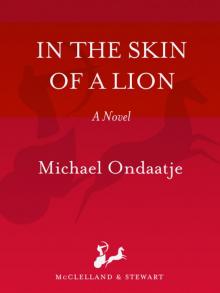 In the Skin of a Lion
In the Skin of a Lion The Cinnamon Peeler
The Cinnamon Peeler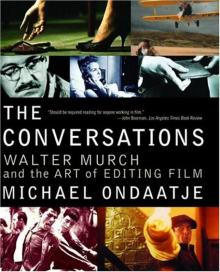 The Conversations: Walter Murch and the Art of Editing Film
The Conversations: Walter Murch and the Art of Editing Film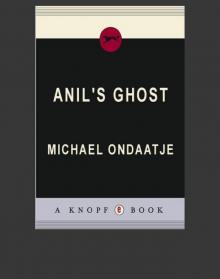 Anil's Ghost
Anil's Ghost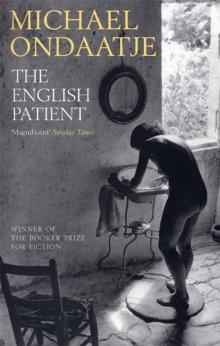 The English Patient
The English Patient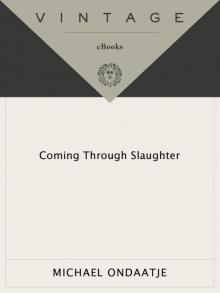 Coming Through Slaughter
Coming Through Slaughter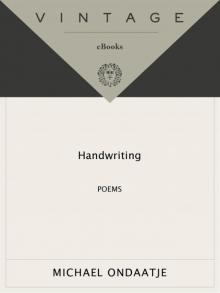 Handwriting
Handwriting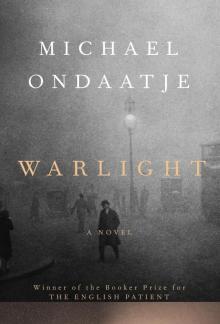 Warlight
Warlight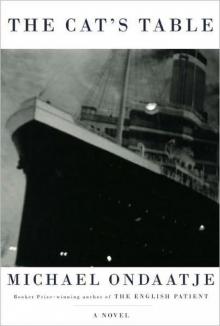 The Cat's Table
The Cat's Table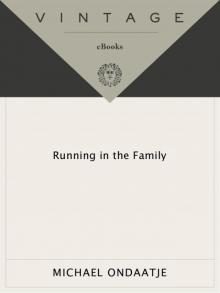 Running in the Family
Running in the Family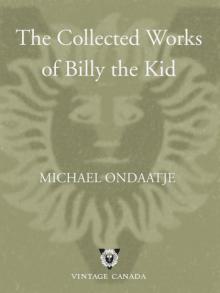 The Collected Works of Billy the Kid
The Collected Works of Billy the Kid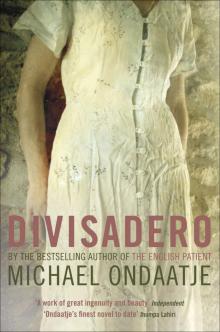 Divisadero
Divisadero